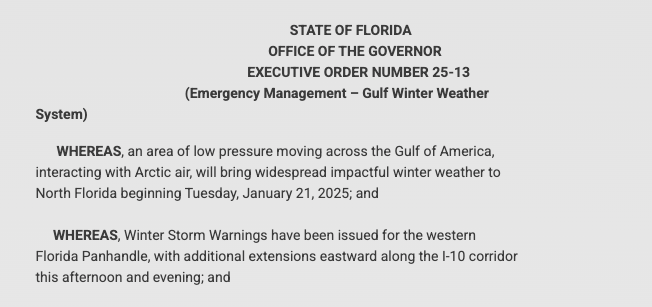Florida has become the first state to refer to the Gulf of Mexico as “The Gulf of America” following in lockstep with Donald Trump’s explosive inaugural speech, according to an official emergency weather advisory.
The daring move to adopt the new name for the 1.6 million km² ocean basin follows Trump’s decision to double down on his promise to rename it in “a short time from now” in his inaugural address Monday.
Much of the U.S. has been grappling with the onset of a cold snap since Sunday so Florida, following suit to warn its residents, issued the Trump-influenced weather statement on behalf of Republican Governor Ron DeSantis.
The emergency announcement, which came just hours after Trump’s fiery speech, read: “WHEREAS, an area of low pressure moving across the Gulf of America, interacting with Arctic air, will bring widespread impactful winter weather to North Florida beginning Tuesday, January 21, 2025; and [...]
“WHEREAS, Winter Storm Warnings have been issued for the western Florida Panhandle, with additional extensions eastward along the I-10 corridor this afternoon and evening; and[...]”

Trump made the declaration of his plans to rename the Gulf, a basin bordered by Mexico, Cuba, and the U.S., earlier this month when he said the “Gulf of America” had a “beautiful ring” to it.
But the President has now signed an official executive order to initiate a formal renaming process because of the Gulf’s position as “a vital region for the multi-billion-dollar U.S. maritime industry, providing some of the largest and most impressive ports in the world”, according to the White House Monday.
However, many people are dumbfounded by the idea and ponder as to whether Trump could, and will, legally be allowed to change the internationally recognized body of water.
How entrenched is the name of the Gulf of Mexico?
The Gulf basin was formed approximately 200 million years ago as tectonic plates rifted within North America causing the Pangea to break up, according to the National Oceanic and Atmospheric Administration (NOAA).
But the etymology of the name dates back to 1672 when French Jesuits conjured a map of their new discovery, “Golphe da Mexique” after an expedition led by Father Jacques Marquette which intended to locate a passage in the Pacific Ocean took them there, according to the Library of Congress.
But even before this, the Aztec civilization, which historians estimate was at its height in 1325 CE called their empire “Mexica” – an area that stretched from the Pacific Ocean to the Gulf of Mexico, to central Mexico, and the north of Honduras and El Salvador in the south, according to John Everett-Heath in his Concise Oxford Dictionary of World Place Names.
When Spanish colonizers arrived in the Americas in 1519, the Aztec empire had been destroyed and the gulf was renamed “Golfo de Nueva España” according to Thomas S. Denison in his 1913 book Mexican Linguistics.
Can Trump officially rename the Gulf?
He most definitely could, but other countries would not have to opt in – in other words, it is not a unilateral decision so other countries will not be forced to adopt the terminology.
Some hierarchical power is held in the palms of the International Hydrographic Organization — an intergovernmental organization of which both the U.S. and Mexico are members.
The IHO’s responsibility is to work to ensure all the world’s seas, oceans, and navigable waters are surveyed and charted and crucially, also assigns names to some of them.
There can be instances where countries refer to a body of water by a different name in their own documentation.
The Independent contacted the IHO for comment.
Has the suggestion been mentioned before?
In 2010, late-night comedian Stephen Colbert spookily made the quip during the Gulf of Mexico oil spill should be renamed as the Gulf of America stating “I don’t think we can call it the Gulf of Mexico anymore” when he announced a charity fund for those affected by the spill.
“We broke it. We bought it”, he claimed.
When could it take shape?
It is unclear when the name could be changed in U.S. documentation but it certainly depends on whether Trump meets resistance from Mexico, the IHO, or U.S. lawmakers.
Florida was Trump’s state of residence before taking office January 20 – it is not clear whether other states will follow suit.
The Independent contacted the Mexican Ministry of Foreign Affairs for comment.







